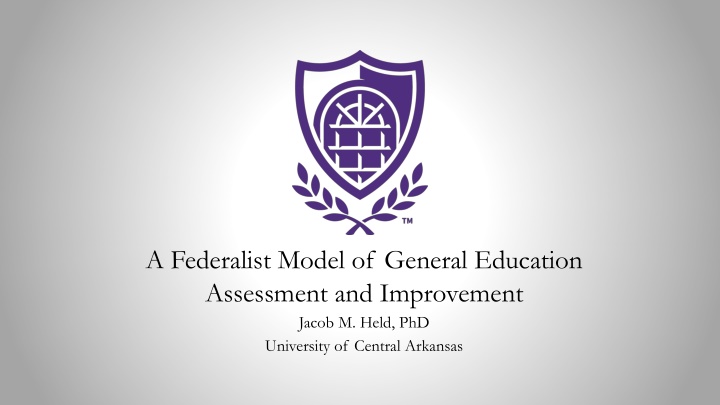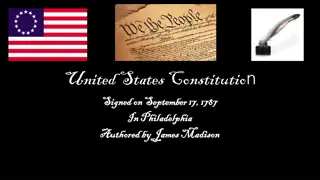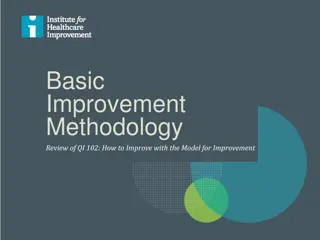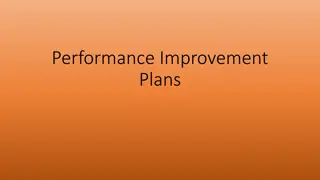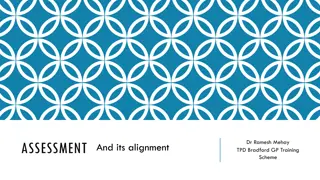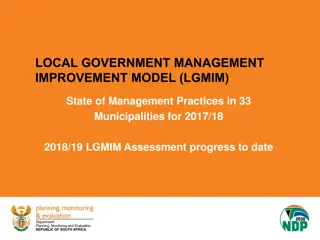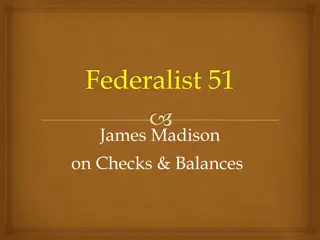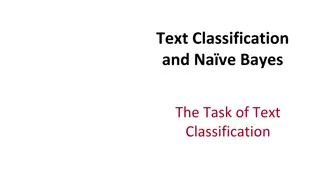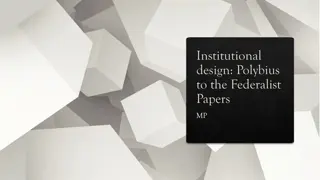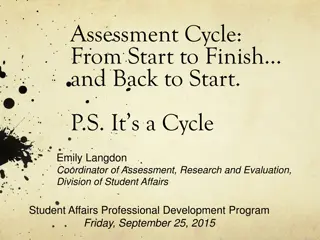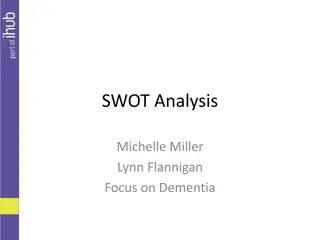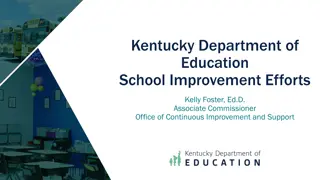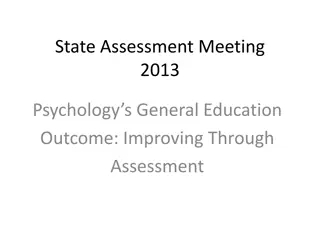A Federalist Model of General Education Assessment and Improvement
In this presentation, Dr. Jacob M. Held from the University of Central Arkansas introduces the concept of a Federalist model for assessing and improving general education. The key takeaways emphasize the importance of assessment processes for prompting improvement and fostering meaningful conversations. The analogy of Federalism in Higher Education is explored, highlighting principles such as departmental integrity, academic freedom, and experimentation. The role of the UCA Core Council in overseeing standards and assessment in general education is also discussed.
Download Presentation

Please find below an Image/Link to download the presentation.
The content on the website is provided AS IS for your information and personal use only. It may not be sold, licensed, or shared on other websites without obtaining consent from the author.If you encounter any issues during the download, it is possible that the publisher has removed the file from their server.
You are allowed to download the files provided on this website for personal or commercial use, subject to the condition that they are used lawfully. All files are the property of their respective owners.
The content on the website is provided AS IS for your information and personal use only. It may not be sold, licensed, or shared on other websites without obtaining consent from the author.
E N D
Presentation Transcript
A Federalist Model of General Education Assessment and Improvement Jacob M. Held, PhD University of Central Arkansas
Todays Presentation Key Concepts: Standards, Trust, Respect, Humility, Experimentation, Autonomy, and Accountability Key Takeaways: Federalism A theory of curricular development, assessment, and improvement. Process is improvement Implementing an assessment process is in- itself improvement. A value of assessment is the conversation it provokes. Improvement follows naturally afterward.
Part I: Building an Analogy: Federalism in Higher Education
What is Federalism in Higher Education Federalism: mode of political organization that unites separate states or other polities within an overarching political system in a way that allows each to maintain its own integrity. The political principles that animate federal systems stress the virtues of dispersed power centres as a means for safeguarding individual and local liberties. (from Brittanica.com) Departmental/College integrity General Education standards Academic Freedom and Experimentation Certitude is not the test of certainty. We have been cocksure of many things that were not so. (Oliver Wendell Holmes, Jr. Natural Law )
The UCA Core Council: The Judiciary Articulated standards: UCA Core Competencies, Goals, Outcomes. Adopted by Faculty Senate Applied to the curriculum and implemented by the departments and colleges Oversight and Review: The role of assessment Restraint: Motivated by humility, respect for integrity, and experimentation.
Part II: Assessment of General Education at the University of Central Arkansas: A Brief Overview
The UCA Core: General Education The UCA Core is a comprehensive, scaffolded, general education curriculum that introduces, develops, and reinforces core competencies. Faculty developed and adopted Fully assessable and routinely assessed Governed by the UCA Core Council, a representative body of faculty from all colleges across campus Administered by the Assistant Provost for Academic Assessment and General Education UCA Core Handbook and Assessment Plan at http://uca.edu/core/for-faculty/
General Education needs to be Assessable and Assessed We value Gen Ed because we value the outcome: informed, engaged citizens. We should be able to articulate these student learning outcomes in terms of a coherent pedagogical theory and practice. We should be able to articulate how we promote student learning and thereby what added value our students receive from our programming. We need to make informed decisions about best practices and improve based on relevant information.
The UCA Core Basic Structure The UCA Core is a comprehensive course of study comprised of a lower (LD) and upper (UD) core curriuclum, and carried through the student s entire undergraduate career. The Core introduces, develops, and applies fundamental competencies around four knowledge and skill areas: Critical Inquiry (I) The ability to analyze new problems and situations to formulate informed opinions and conclusions; Effective Communication (C) The ability to develop and present ideas logically and effectively in order to enhance communication and collaboration with diverse individuals and groups; Responsible Living (R) The ability to address real-world problems and find ethical solutions for individuals and society; Diversity (D) The ability to analyze familiar cultural assumptions in the context of the world s diverse values, traditions, and belief systems as well as to analyze the major ideas, techniques, and processes that inform creative works within different cultural and historical contexts.
Scaffolding Lower Division: Introduce and Develop Skills Upper Division: Reinforce and Demonstrate Mastery Capstone: Culminating Educational Experience
The Assessment Cycle Assessment of the UCA Core proceeds on a 4 year cycle. Each year a single competency, with all of its associated goals, is assessed. The first four year cycle provides initial data. A second four cycle provides an additional data set. A full programmatic assessment is scheduled after 10 years. Academic Year 16-17 17-18 18-19 19-20 20-21 Assess RL D C CI RL Evaluate RL D C CI Train RL D C Implement RL D
The Assessment Process Collect Artifacts Faculty Development Score Artifacts Collect and Process Data Interventions Improvement Teams
Diversity Cycle Pre-Cycle Training: Facilitated in coordination with the Office of Diversity and Inclusion Artifact Scoring: Faculty scorers from across the campus score artifacts from all Diversity courses Results: Lack of substantive growth from lower to upper division. Lack of clarity on the rubrics and expectations. Improvement: Among other measures, decided to do a full review of all lower level diversity courses.
The LD Core Review Process Review all courses falling under the Diversity competency of the Lower Division Core. Assurance of quality Continued conversations about expectations Request materials for all extant sections of courses that fall under Diversity Reviewed by a sub-committee of the Core Council Report to Core Council and Departments providing Diversity courses.
Part III: LD Core Review Process Federalism in Practice
The Goal of the Review 1) Assure integrity in the UCA Core as an academic program: Curricular coherence, consistency of standards, shared student learning experiences 2) Review newer courses as well as grandfathered courses as we have learned what the core actually is/means. 3) Continue/Perpetuate the conversation about core learning outcomes, student learning, and expectations.
Core standards: The Principle When the UCA Core Council considers proposals to add a course to the LD Core, considerations include: 1) Does the majority of course content in the proposed course explicitly address the outcomes of the competency and corresponding goal under which the course would be designated; 2) does the course curriculum, as a whole, address the competency in question; 3) Is the assignment (or assignments) designated as assessing for the learning outcomes well-designed.
LD Core Review Process: Diversity All courses in all Diversity areas of LD Core reviewed. Evaluated by whichever rubric they fall under. Diversity in Creative Works falls under Diversity Goal C Review extant course offerings by reviewing material from all regularly offered sections: Consistent with standards Consistent with outcomes Should offer a consistent academic experience. (Family resemblance of courses)
Diversity Review Process Review course materials Review Course materials Determination: Course fails to meet core standards Determination: Course meets core standards Contact department: Provide report. Ask for assurance argument. Send to Core Council for affirmation. No further action required. Informational report sent to department Assurance argument reviewed by Core Council.
Results for Diversity 33 courses evaluated 11 courses required assurance arguments 5 assurance arguments received to date (COVID!) All assurance arguments accepted by UCA Core Council
Sample Departmental Report From the report on ENGL 2370: Intro to Fiction: In general, given that Intro to Fiction, as a UCA course, falls under the Diversity in Creative Works category of the UCA Core, and thus is intended to align to and promote learning outcomes promoting appreciation of diverse viewpoints, UCA s intro to fiction should look distinctively different from an intro to fiction course you might see at another university. It should demonstrate a devotion to the diversity outcomes. This is where the committee struggled. Dr. [X s] course looked like a fascinating intro to fiction course, but didn t look like it took diversity to heart in its course offerings and assignments. Ms. [Y s] came much closer. However, all sections of the course should be as committed and explicit in their engagement with the rubric.
The Benefits of the Process Builds shared understanding of expectations Reinforces quality of all course offerings. Politically disarms critics by reaffirming shared commitment to student learning outcomes Perpetuates constructive conversations.
A Greater Conversation What does teaching Diversity mean? Can learning in Diversity be assessed? Is what we re doing enough?
Part IV: Diversity and General Education at UCA
Issues with the diversity standard The standard is unclear: What does diversity mean? Ideological diversity, racial diversity, gender ? What does this look like in a course? How is it reflected in course work? Authors from diverse backgrounds, or substantively diverse perspectives? Can these outcomes be assessed? How do you measure or verify empathy or openness ? Scorer feedback reinforces these difficulties. Is this enough when it comes to promoting diversity? Some think we ought to be doing more with respect to social justice
Is it enough? Some desire that campus do more; require the curriculum to promote social justice or anti-racist pedagogies. But that fails to appreciate the role of general education, the holistic nature of education. Our Diversity standard is the required minimum, like a Federal statute. It is not exhaustive of what can be done, nor does it prohibit greater engagement. Our standard and process respects academic freedom and autonomy, given the amorphous nature of diversity Offers the freedom to experiment, be creative within departments Avoids the mortal sin of bad administrations: micro managing and top down pet projects
Can these outcomes be assessed? Like any grader, we can only see outputs; we aren t telepaths We can discuss intentions but only measure outputs Plus, assessment data in higher education is fundamentally flawed. We measure indiscreet data using interval or ratio variables. We can t meet most assumptions for proper statistical analyses. Nor can we reproduce results or guarantee anything like clinical conditions. So all data needs to be interpreted in this context. Is there no virtue among us? If there be not, we are in a wretched situation. No theoretical checks no form of government can render us secure. (James Madison)
The standard is unclear But do we know it when we see it? This is rhetorical, but Yes we do. The standards are not insufferably vague. We can afford to be vague since we are not draconian in our enforcement mechanisms. Need to avoid disciplinary biases. There are no real experts in diversity unlike quantitative literacy, written communication Some play must be allowed in the joints if the machine is to work. (Oliver Wendell Holmes, Jr.)
Conclusions There is no way to build a perfect system There is a way to conduct a viable, constructive process Procedures are crucial : oversight, compliance, engagement. Need a clear, fair, predictable, and stable process Predicated on humility, perspective, and restraint and thereby builds trust and cooperation.
Contact Information Jacob Held, PhD Assistant Provost for Academic Assessment and General Education Professor of Philosophy University of Central Arkansas 501-450-5307 jmheld@uca.edu
